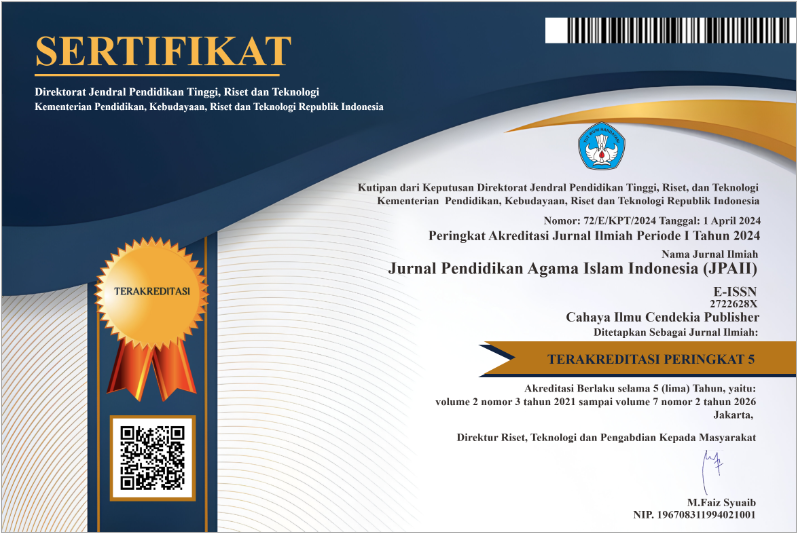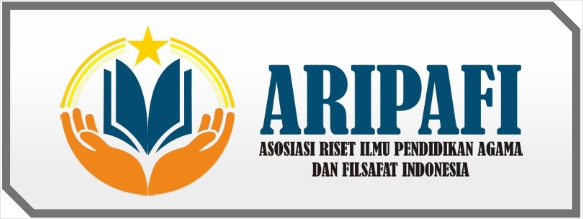Application of the Make A Match Cooperative Learning Model in Memorizing Short Surahs
Abstract
Purpose of the study: This research aims to find out how to apply the make a match cooperative learning model in memorizing short letters at the Madrasah Ibtidaiyah al-Muhajirin, Bitung City. And examine and reveal the supporting and inhibiting factors in implementing the make a match type cooperative learning model in memorizing short letters at the al-muhajirin madrasah al-muhajirin Bitung City.
Methodology: This research uses a descriptive qualitative approach with a focus on planning and implementing learning and involving class III students at Madrasah Ibtidaiyah Al-Muhajirin in memorizing short letters. Data collection methods involve observation, interviews, and documentation. Data analysis includes reduction, presentation and drawing conclusions. The indicator of the success of this research is students' mastery of the material according to the stated objectives.
Main Findings: The main finding of this research is that the application of the make a match cooperative learning model is able to improve student learning outcomes in memorizing short letters at the Madrasah Ibtidaiyah al-Muhajirin, Bitung City. Through the use of question and answer cards in learning sessions, students are more involved and active in understanding the material. Student interaction in groups also encourages collaboration and helps each other in mastering learning content.
Novelty/Originality of this study: The novelty of this research lies in the application of the make a match type cooperative learning model in the context of learning to memorize short letters in the Al-Quran at madrasah ibtidaiyah. This approach can provide a new alternative in improving the quality of learning and student learning outcomes in the field of religion, and can be adopted by similar educational institutions to overcome similar obstacles in learning.
References
D. Priantono, I. Chalid, and Y. H. Lubis, “Implementasi Pendekatan Saintifik Dalam Pembelajaran Akidah Akhlak di Madrasah,” Ad-Dariyah J. Dialekt. Sos. dan Budaya, vol. 4, no. 1, pp. 63–68, 2023.
A. Ghozali, M. Nasor, and R. Setyaningsih, “Peran Guru Akidah Akhlak Dalam Pembinaan Akhlak Peserta Didik Di Madrasah Tsanawiyah,” UNISAN J., vol. 2, no. 3, pp. 992–1001, 2023.
S. L. Iftitah et al., “Urgensi Sosialisasi Pendidikan Dalam Merevitalisasi Semangat Belajar Siswa: Array,” BEKTI J. Pengabdi. Kpd. Masy., vol. 1, no. 3, pp. 104–112, 2023.
M. Mukodi, “Tela’ah Filosofis Arti Pendidikan dan Faktor-Faktor Pendidikan dalam Ilmu Pendidikan,” J. Penelit. Pendidik., vol. 10, no. 1, pp. 1468–1476, 2018.
M. Fikri, “Model Pendidikan Karakter Melalui Bakti Sosial Keagamaan Di Pondok Pesantren Al-Hikmah 2 Brebes,” J. Pendidik. Ris. Konseptual, vol. 4, no. 4, 2019.
L. T. Yulianingsih and A. Sobandi, “Kinerja mengajar guru sebagai faktor determinan prestasi belajar siswa,” J. Pendidik. Manaj. Perkantoran, vol. 2, no. 2, p. 49, 2017.
H. T. Elitasari, “Kontribusi Guru dalam Meningkatkan Kualitas Pendidikan Abad 21,” J. Basicedu, vol. 6, no. 6, pp. 9508–9516, 2022.
E. Untari, “Efektivitas Model Pembelajaran Kooperatif Tipe Think Pair Share (TPS) Dan Tipe Time Token Arends Terhadap Prestasi Belajar Matematika Ditinjau Dari Kemampuan Berinteraksi Siswa,” J. Focus Action Res. Math. (Factor M), vol. 3, no. 1, pp. 1–17, 2020.
N. Fatimah, G. Mujianto, and K. Yudiantoro, “Peningkatakan Hasil Belajar Pendidikan Pancasila Kurikulum Merdeka Siswa Kelas IB SDN 02 Girimoyo Malang Melalui Problem Based Learning,” JPK (Jurnal Pancasila dan Kewarganegaraan), vol. 8, no. 2, pp. 1–11, 2023.
F. E. Sasmita and R. S. Kusuma, “Pengembangan Keterampilan Berpikir Kritis Siswa SD Melalui Model Pembelajaran Inkuiri Terbimbing Dalam Pembelajaran IPA,” J. Pendidik. PENGAJARAN, vol. 1, no. 2, pp. 238–251, 2023.
H. Abdillah and J. Nurhodijah, “Model Pembelajaran Make A Match Dalam Menghafal Al-Quran : Studi Pada Siswa Kelas IV SDN Wanasari 02 Cibitung Kabupaten Bekasi”, el Arafah, vol. 2, no. 1, pp. 43–52, Jan. 2023.
U. Rofiqoh and K. Fathoni, “Tinjuauan Hukum Islam Terhadap Pengembangan Wisata Tumpak Lego Hill di Desa Krajan Kecamatan Ngrayun Kabupaten Ponorogo,” Soc. Sci. Acad., vol. 1, no. 2, pp. 69–76, 2023.
Z. Rahmani, M. Hijran, and D. Oktariani, “Peran Pendidikan Ekonomi Syariah terhadap Pembangunan Karakter Bangsa,” AL-Muqayyad, vol. 6, no. 1, pp. 42–48, 2023.
I. Jufri, A. Riawarda, and N. Rahmah, “Model Pembelajaran Kooperatif Tipe Make A Match Untuk Meningkatkan Hasil Belajar Pendidikan Agama Pendahuluan Keberhasilan pencapaian tujuan pendidikan terutama ditentukan oleh,” J. Islam. Educ., vol. 4, no. 1, pp. 61–70, 2021, [Online]. Available: http://ejournal.iainpalopo.ac.id/index.php/iqro.
S. U. Rizal, “Meningkatkan Hasil Belajar Pai Materi Asmaul Husna Menggunakan Model Make A Match Kelas IV SDN Patung Tahun,” in Seminar Nasional Pendidikan Profesi Guru Agama Islam “Peran Guru Dalam Peningkatan Kualitas Pendidikan di Era Digital,” vol. 3, no. 2, pp. 1399–1408, 2023.
Copyright (c) 2023 Siti Hindun Ishak

This work is licensed under a Creative Commons Attribution-NonCommercial 4.0 International License.
Authors who publish with this journal agree to the following terms:
- Authors retain copyright and acknowledge that the Jurnal Pendidikan Agama Islam Indonesia (JPAII) is the first publisher licensed under a Creative Commons Attribution 4.0 International License.
- Authors are able to enter into separate, additional contractual arrangements for the non-exclusive distribution of the journal's published version of the work (e.g., post it to an institutional repository or publish it in a book), with an acknowledgment of its initial publication in this journal.
- Authors are permitted and encouraged to post their work online (e.g., in institutional repositories or on their website) prior to and during the submission process, as it can lead to productive exchanges and earlier and greater citation of published work.






.png)
.png)





















